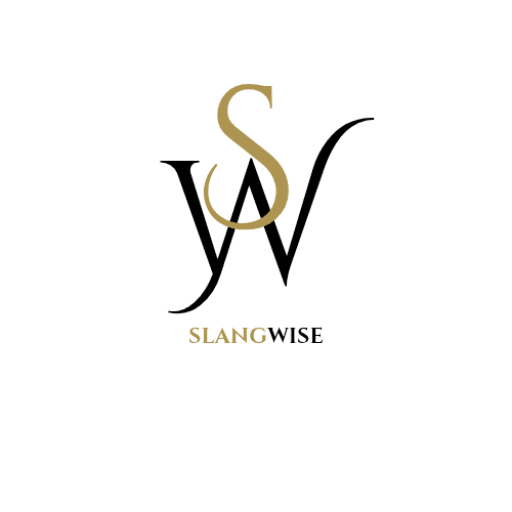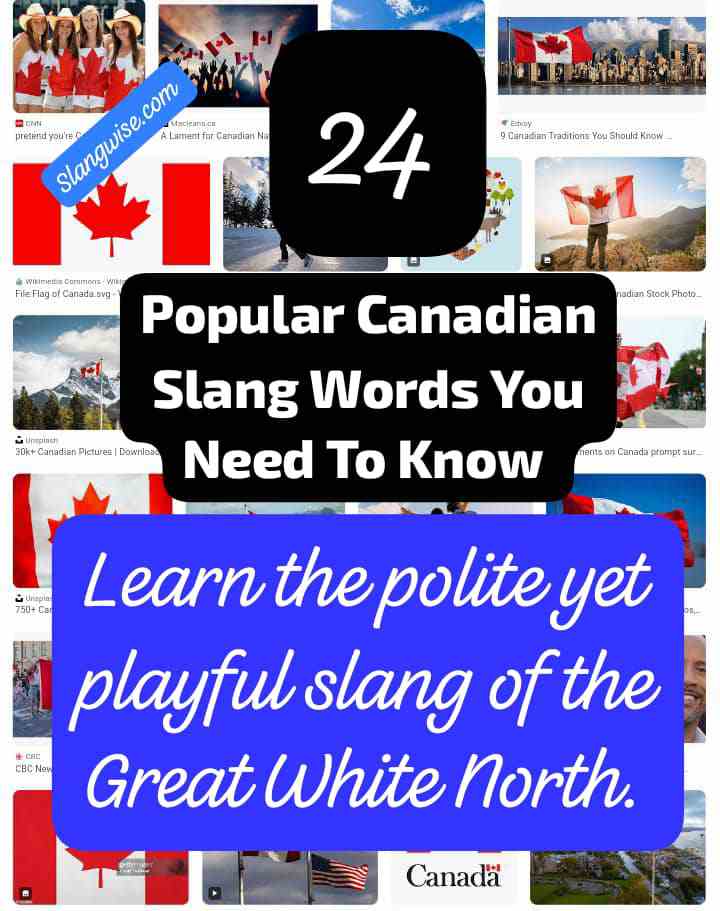Canadian slang mixes polite manners, dry humour, and local flavour. This post lists 24 Popular Canadian slangs, explains when each fits, and gives short examples for natural use.
The goal is practical: learn words that make conversations flow at a coffee shop or backyard barbecue.
I drew on local history, Indigenous words, and British and American influences to highlight both nationwide and region-specific terms. Read the list to build familiarity and speak with ease.
Slangwise tip: Learn the tone more than the word, Canadian slang often aims for polite friendliness, so soften bold statements with a smile (or an “eh?”).
Table of Contents
24 Popular Canadian Slang Words To Know
1. Eh?
Eh? in Canadian slang is a conversational tag that invites agreement or softens statements. Often placed at the end of a sentence, it signals friendliness rather than confrontation. Best used in informal settings or when seeking confirmation.
Example: “Nice day for a walk, eh?”
2. Toque
A knitted winter hat; common across Canada and pronounced “tuke.” Use when talking about cold-weather gear or local style, “beanie” is understood but “toque” is distinctly Canadian.
Example: “Grab your toque; it’s freezing out there.”
3. Double-double
A coffee order with two creams and two sugars, popularized by a major national chain. Use in cafés or when imitating common Canadian coffee orders.
Example: “I’ll take a medium double-double, please.”
4. Loonie
Slang for the one-dollar coin, named after the loon bird pictured on it. Useful when talking money in casual conversation or counting change.
Example: “That snack costs five loonies.”
5. Toonie
The two-dollar coin; a playful blend of “two” and “loonie.” Use when referencing small amounts of cash or casual budgets.
Example: “Can you lend me a toonie for the bus?”
6. Timmies
An affectionate nickname for Tim Hortons, used to describe the chain and its products. Common in everyday talk across Canada.
Example: “Meeting at Timmies at ten?”
7. Chesterfield
An older term for a sofa or couch. Still heard in some regions or among older speakers; it adds a vintage flavour when used.
Example: “Set the groceries down on the chesterfield.”
Most Popular American Slang Words of 2025: Want to sound like everyone in 2025? Master these 35 American slang words today, click to unlock the full list and level up your convo.
8. Hoser
Hoser is a humorous, slightly dated Canadian slang term for someone who acts silly or clumsy. Best used among friends who recognize the joke.
Example: “Stop being a hoser and pass the keys.”
9. Runners
The Canadian word for athletic shoes or sneakers. Widely used and understood across age groups.
Example: “Put on your runners for the park.”
10. Dep (dépanneur)
Short for Quebec’s convenience store, “dépanneur.” Use in Quebec or when referring to a local corner shop there.
Example: “Pick up milk at the dep, will you?”
11. Two-four
A case of 24 beers; a common unit when planning casual gatherings. Often used for barbecues, cottage weekends, and parties.
Example: “Bring a two-four to the cottage.”
12. Give’r
Give’r is a Canadian slang that means to give something full effort, work, driving, or partying. It conveys enthusiasm and no-holds-barred energy.
Example: “Give’r on the final lap and you’ll catch up.”
13. Keener
A keen, eager person, often used for someone very studious or enthusiastic. Can be teasing or admiring, depending on tone.
Example: “She’s a real keener about the volunteering schedule.”
READ ALSO: From “bogan” to “fair dinkum”, 18 Aussie slang words that’ll leave you saying Crikey! Don’t miss #12.
14. Beauty
An adjective meaning excellent or impressive. Flexible and friendly, it works for objects, performances, or moments.
Example: “That save in the game was a beauty.”
15. Kerfuffle
Kerfuffle in Canada term is a small commotion or fuss, typically over something minor. Polite and slightly old-fashioned, it softens criticism.
Example: “There was a kerfuffle over the seating arrangements.”
16. Pop
The general Canadian term for sweet, carbonated soft drinks in many regions (also “soda” or “cola” elsewhere). Use “pop” in casual, informal contexts.
Example: “Grab some pop from the fridge.”
17. Mickey
In Canada, a “mickey” is a small bottle of liquor, usually 375 ml. Use with caution; it’s alcohol-related and informal.
Example: “He brought a mickey for the bonfire.”
18. Mollycoddle
A gentle, slightly old-fashioned word meaning to pamper or overprotect. Used to critique excessive fussing in a light way.
Example: “Don’t mollycoddle the kids; let them try it themselves.”
19. Canuck
A colloquial, affectionate term for a Canadian person. Widely used in sports and national contexts; tone determines warmth.
Example: “Proud to be a Canuck at the home game.”
20. Hydro
Short for hydroelectric power or the public utility that supplies electricity in many provinces. Common in everyday discussions about bills or power.
Example: “The hydro bill came in higher this month.”
21. Skookum
Borrowed from Pacific Northwest Indigenous languages and adopted into regional slang in western Canada, meaning strong, impressive, or reliable. Regional usage, use with local sensitivity.
Example: “That truck is skookum; it never breaks down.”
22. Pogey
Pogey is a Canadian slang term for unemployment benefits or, historically, petty welfare. Old-fashioned and mostly historical, it still appears in veteran or labour discussions.
Example: “After the layoff, he was on the pogey for a few months.”
23. Tuck shop
A small shop or kiosk, often in schools or community centres—selling snacks and simple supplies. Used in a quaint or regional context.
Example: “The tuck shop sells chocolate bars at recess.”
24. Skitty
A playful term for someone who’s jittery, nervous, or overly excited, often in a lighthearted, affectionate way.
Example: “She was a bit skitty before the exam.”
When to use these Canadian words, and when to hold back.
Canadian slang varies by region and by generation. Some terms, like “double-double” and “timmies,” are safe and widely understood; others, such as “dep” (Quebec) or “skookum” (West Coast), are regional and work best when used among locals or after listening to the conversational rhythm.
Older terms like “chesterfield” or “pogey” carry vintage or historical flavour, use them to add character, not confusion.
Tone and politeness matter
Canadian speech is often understated and polite. Slang fits best when it matches that tone: light, friendly, and inclusive. Adding “eh?” or softening a directive with “maybe” or “if you want” often makes the slang sound natural rather than forced.
Origins of Canadian Slangs
Many Canadian slang terms trace back to Indigenous languages, British English, and the distinct cultural mix across provinces. Using slang accurately means paying attention to context, what’s casual in a kitchen chat may not fit a workplace meeting.
Finally
Slang is a living part of language. Some entries here are national staples; others are regional or fading. Use them with awareness, listen first, then speak, and the result will be language that feels both friendly and authentically Canadian.

